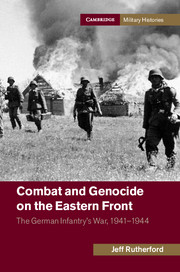Book contents
- Frontmatter
- Table of contents
- List of illustrations
- List of figures
- List of maps
- List of tables
- Acknowledgments
- Introduction
- 1 The Wehrmacht and German society
- 2 Preparations for war
- 3 “Attack with a ruthless offensive spirit and … a firestorm of destruction”
- 4 “Will the continuation of this attackbe worth it?”
- 5 “It is only a question of where, not if, civilians will starve”
- 6 The failure of Operation Barbarossa
- 7 The Soviet winter offensive, 1942
- 8 “The population … shouted out to the interpreter that one would rather be shot instead of being left to starve”
- 9 “From one mess to another”
- 10 “We need to fight to the end, so oder so”
- 11 A more rational occupation?
- 12 “As miserable representatives of themiserable twentieth century, we burnedall of the villages”
- Conclusion
- Bibliography
- Index
- References
8 - “The population … shouted out to the interpreter that one would rather be shot instead of being left to starve”
The evolution of military necessity
Published online by Cambridge University Press: 05 July 2014
- Frontmatter
- Table of contents
- List of illustrations
- List of figures
- List of maps
- List of tables
- Acknowledgments
- Introduction
- 1 The Wehrmacht and German society
- 2 Preparations for war
- 3 “Attack with a ruthless offensive spirit and … a firestorm of destruction”
- 4 “Will the continuation of this attackbe worth it?”
- 5 “It is only a question of where, not if, civilians will starve”
- 6 The failure of Operation Barbarossa
- 7 The Soviet winter offensive, 1942
- 8 “The population … shouted out to the interpreter that one would rather be shot instead of being left to starve”
- 9 “From one mess to another”
- 10 “We need to fight to the end, so oder so”
- 11 A more rational occupation?
- 12 “As miserable representatives of themiserable twentieth century, we burnedall of the villages”
- Conclusion
- Bibliography
- Index
- References
Summary
The destruction of the Volkhov pocket: the 121st and 126th Infantry Divisions
While the 123rd and 126th IDs experienced real crisis in early 1942, the 121st ID experienced a relatively tranquil beginning to the year. For the most part, continual Red Army patrols and raids, complemented by steady artillery fire, confronted the East Prussians. Both of these activities forced the 121st ID to maintain constant vigilance with decreasing numbers of men, which in turn led to a declining morale and effectiveness. The Red Army’s crushing superiority in artillery caused heavy casualties in the infantry regiments manning the forward lines and led to frantic calls for reinforcements as well as demands for a break from the fighting. Though replacements trickled in from the rear, the constant attrition forced the establishment of two combat companies from supply and administrative troops. Despite these issues, the Leningrad front remained relatively tranquil, especially during the spring of 1942. In a letter sent home, a member of the East Prussian 1st ID wrote, “the front on the Narva has become quiet. The days of up to four attacks have died down like a stormy wave on the sea. Our dam has stood firm, even though many holes have been torn in it.”
During this break from heavy fighting, the soldiers took stock of their situation. Frustrated at their inability to seize Leningrad when it stood so close to their positions, they nonetheless took pride in their ability to repulse every Red Army attack. One East Prussian in the 21st ID commented,
the Russian comes through the swamp and primeval forest, where no one believes possible. His tanks know no obstacles … His equipment is very good … his tactical leadership is also good … his weapons are good. And yet he fails against the German infantryman.
- Type
- Chapter
- Information
- Combat and Genocide on the Eastern FrontThe German Infantry's War, 1941–1944, pp. 240 - 279Publisher: Cambridge University PressPrint publication year: 2014



